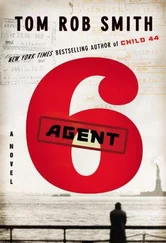Tom Smith - The Secret Speech
Здесь есть возможность читать онлайн «Tom Smith - The Secret Speech» весь текст электронной книги совершенно бесплатно (целиком полную версию без сокращений). В некоторых случаях можно слушать аудио, скачать через торрент в формате fb2 и присутствует краткое содержание. Жанр: Триллер, на английском языке. Описание произведения, (предисловие) а так же отзывы посетителей доступны на портале библиотеки ЛибКат.
- Название:The Secret Speech
- Автор:
- Жанр:
- Год:неизвестен
- ISBN:нет данных
- Рейтинг книги:5 / 5. Голосов: 1
-
Избранное:Добавить в избранное
- Отзывы:
-
Ваша оценка:
- 100
- 1
- 2
- 3
- 4
- 5
The Secret Speech: краткое содержание, описание и аннотация
Предлагаем к чтению аннотацию, описание, краткое содержание или предисловие (зависит от того, что написал сам автор книги «The Secret Speech»). Если вы не нашли необходимую информацию о книге — напишите в комментариях, мы постараемся отыскать её.
The Secret Speech — читать онлайн бесплатно полную книгу (весь текст) целиком
Ниже представлен текст книги, разбитый по страницам. Система сохранения места последней прочитанной страницы, позволяет с удобством читать онлайн бесплатно книгу «The Secret Speech», без необходимости каждый раз заново искать на чём Вы остановились. Поставьте закладку, и сможете в любой момент перейти на страницу, на которой закончили чтение.
Интервал:
Закладка:
— Three years of passing each other on the stairs and I never asked your name. I didn’t want to…
— Worry me?
— Would it have?
— Honestly, yes.
— My name is Leo.
The baker offered his hand. Leo shook it.
— My name is Filipp. Three years, and I never offered you a loaf of bread.
Leaving the homicide office for the last time, Leo glanced back before shutting the door. Feeling an awful kind of lightheadedness, he followed Filipp downstairs where he was handed a round loaf — still warm, the crust golden. He broke the bread, biting into it. Filipp studied his reaction carefully. Realizing his opinion was being sought, Leo finished the mouthful and said:
— This is the best bread I’ve ever eaten.
And it was true. Filipp smiled. He asked:
— What did you do up there? Why all the secrecy?
Before Leo had a chance to reply, the question was retracted:
— Ignore me. I should mind my own business.
Still eating, Leo ignored the retraction:
— I was in charge of a specialist division of the militia, a homicide department.
Filipp was silent. He didn’t understand. Leo added:
— We investigated murders.
— Was there much work?
Leo gave a small nod:
— More than you might think.
Accepting another loaf to take home, as well as the remains of the one he’d started, Leo turned to leave. Filipp called out, trying to end on a positive note:
— It gets hot here in the summer. You must be pleased to be moving to another location?
Leo looked down, studying the pattern of flour footprints:
— The department isn’t moving. It’s closing down.
— What about you?
Leo looked up:
— I’m to join the KGB.
SAME DAY
THE SERBSKY INSTITUTE WAS A MODEST-SIZED building with curved steel balconies around the top-floor windows, more like a block of attractive apartments than a hospital. Raisa paused, as she always did at this point, fifty meters away, asking herself if she was doing the right thing. She glanced down at Elena, standing by her side, holding her hand. Her skin was supernaturally pale, as though her body were fading. She’d lost weight and was unwell with such regularity that sickness had become her usual state. Noticing Elena’s scarf had come loose, Raisa crouched down, fussing over her:
— We can go home. We can go home at any time.
Elena remained silent, her face blank, as if no longer a real girl but a replica created with tissue-paper skin and green pebble eyes, emitting no energy of her own. Or was it the other way round? Was Raisa the replica, fussing and caring in an imitation of the things a real mother would do?
Raisa kissed Elena on the cheek and, garnering no response, felt her stomach knot. She had no resilience to this indifference, indifference that had begun when she’d knelt down, her eyes filled with tears, and whispered into Elena’s ear:
Zoya is dead.
Raisa had expected an outburst of grief, but Elena hadn’t reacted. Five months later, she still hadn’t reacted, not in any ordinary, outward sense.
Raisa stood up, checking on the traffic, crossing the road and approaching the main entrance. The Serbsky Institute was a desperate measure, but she was desperate. Love wasn’t going to save them. Love simply wasn’t enough.
Inside — stone floors, bare walls — nurses in crisp uniforms pushed steel trolleys equipped with leather restraints. Doors were bolted. Windows were barred. There could be no doubt that the institute’s reputation as the city’s foremost psychiatric center was a point of notoriety rather than acclaim. A treatment center for dissidents, political opponents were admitted for insulin-induced comas and the latest in pyrogenic and shock therapy. It was an improbable place to seek assistance for a seven-year-old girl.
In their discussions Leo had repeatedly stated his opposition to psychiatric help. Many of those he’d arrested for political crimes had been sent into a psikhushka , a hospital such as this. While Leo agreed, as indeed he had to, that there might be good doctors working within a brutal system, he didn’t believe that the risk in searching for those men and women warranted the potential gain from their expertise. Declaring yourself unwell was tantamount to positioning yourself in the fringes of society, not a place any parent or guardian would want for their child. Yet his stance seemed less like caution and more like mulish stubbornness — a blind determination to be the one that fixed his family even as it crumbled in his hands. Raisa was no doctor, but she understood that Elena’s sickness was as threatening as a physical aliment. She was dying. It was primitive to hope the problem would merely pass.
The woman behind the front desk glanced up, recognizing them from previous visits.
— I’m here to see Doctor Stavsky.
Working behind Leo’s back, talking to friends, colleagues, she’d secured an introduction with Stavsky. Despite a career in treating dissidents, with all that entailed, Stavsky believed in the value of psychiatry beyond the political sphere and disapproved of the excesses of punitive treatments. He was motivated by a desire to heal and he’d agreed to examine Elena without making any official record. Raisa trusted him much as a person lost at sea would put their faith in a drifting plank of wood. She had little choice.
Upstairs, summoned in, Doctor Stavsky crouched down in front of Elena:
— Elena? How are you?
Elena didn’t reply.
— Do you remember my name?
Elena didn’t reply. Stavsky stood up, addressing Raisa in a whisper:
— This week?
— No change, not a word.
Stavsky directed Elena to the scales:
— Please take off your shoes.
Elena didn’t respond. Raisa knelt down, taking her shoes off, guiding Elena onto the scales. Stavsky peered at the display, noting her weight. He tapped his pen against his pad, running his eyes across the numbers accumulated these past weeks. He stepped back, perching on his desk. Raisa moved forward to help Elena off the scales but Stavsky stopped her, indicating that she leave Elena where she was. They waited. Elena remained on the scales, facing the wall, doing nothing. Two minutes became five minutes became ten minutes and Elena still hadn’t moved. Finally, Stavsky indicated that Raisa should help Elena off the scales.
Fighting back tears, Raisa finished tying Elena’s laces and stood up, about to ask a question, only to see Stavsky on the telephone. He hung up, placing his pad on the desk. She didn’t know how or why but she knew she’d been betrayed. Before she could react, he said:
— You came to me for help. It is my view that Elena needs professional, full-time supervision.
Two male orderlies entered the room, closing the door behind them like a trap slamming shut. Raisa wrapped her arms around Elena. Stavsky slowly approached:
— I have arranged for her to be admitted to a hospital in the city of Kazan. I know the staff at the hospital well.
Raisa shook her head, in disbelief as much to rebut his proposal:
— This is no longer up to you, Raisa. The decision has been made in the interest of this young girl. You are not her mother. The State has appointed you her guardian. The State is taking back guardianship.
— Doctor…
She spat the word out with contempt.
— You are not taking her.
Stavsky moved closer, whispering:
— I will tell Elena that she is going with these nurses to Kazan. I will tell her that she will not see you again. I am quite certain that she will not react. She will walk out of this room, with those two strangers, and she won’t even look back. If she does, will you then believe that you cannot help her?
Читать дальшеИнтервал:
Закладка:
Похожие книги на «The Secret Speech»
Представляем Вашему вниманию похожие книги на «The Secret Speech» списком для выбора. Мы отобрали схожую по названию и смыслу литературу в надежде предоставить читателям больше вариантов отыскать новые, интересные, ещё непрочитанные произведения.
Обсуждение, отзывы о книге «The Secret Speech» и просто собственные мнения читателей. Оставьте ваши комментарии, напишите, что Вы думаете о произведении, его смысле или главных героях. Укажите что конкретно понравилось, а что нет, и почему Вы так считаете.












